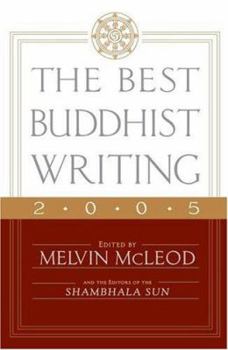The Best Buddhist Writing 2005
(Part of the The Best Buddhist Writing Series)
Wise and witty, heartfelt and profound, this second volume in an annual series brings together the year's most notable prose and verse inspired by the power and insight of Buddhist practice. Compiled... This description may be from another edition of this product.
Format:Paperback
Language:English
ISBN:1590302753
ISBN13:9781590302750
Release Date:October 2005
Publisher:Shambhala Publications
Length:320 Pages
Weight:0.86 lbs.
Dimensions:0.9" x 5.5" x 8.4"
Customer Reviews
5 ratings
Coming at awareness from all sides
Published by Thriftbooks.com User , 15 years ago
The authors here come from all directions: cooks, scientists, artists, soldiers, business people, patients in the hospital, prisoners in jail. Some articles concern the experience of meditation; others focus on mindful living in the office or on Sunset Boulevard. Some writing is artful as flower arrangement, some is philosophical, and most is just plain sense. A few essays made me weep. Especially Scott Darnell's account of struggling to find peace and share it in jail, while serving a life-long sentence for committing murder as a teenager. For me, the most practically helpful article is Michael Carroll's "Waking Up at Work." The most mentally interesting is Sam Harris, the famous critic of religion, pointing out the validity of Eastern religions in their quest for deeper self-awareness.
The Top 40 - Make That 32
Published by Thriftbooks.com User , 16 years ago
Growing up, I was a big fan of listening to the top 40 songs that were played on the radio. They were the best songs of the year. This wonderful book excites me in a similar way. These are the top 32 articles on Buddhism for 2005. They will stand the test of time. They will be just as relevant many years from now. Melvin Mcleod (editor) does a great job weaving these stories together. They are eye opening and instructive and people will resonate to these stories to whatever extent their readiness allows them to benefit from them. It is not a self-help book but it can indeed be helpful. It is not necessary to be steeped in Buddhism to enjoy this book, but if you are, you will not be disappointed.
A wonderful introduction to Buddhism in North America
Published by Thriftbooks.com User , 18 years ago
"Waking Up At Work" caught my eye while I was flipping through the pages of The Best Buddhist Writing 2005. I was at the time feeling out of sorts about my relationship with my job and while standing in a quiet corner of the bookstore devoured half of Michael Carroll's article before deciding this might be a volume worth taking home. That was a good decision. It's been one of the more enlightening books I've had the pleasure to read this year. Not because it lead me to a great spiritual awakening, but simply because it features nuanced writing on a variety of interesting topics, everything from reimagining the work place to the pleasures of spending time with children, from the history of Japanese haiku to teachings on mediation from some of the world's great Buddhist masters, from stories of personal redemption from violence and addiction to contemplations on the mysteries of nature. 32 non-fiction articles are collected here under the guidance of Melvin McLeod, Editor-in-Chief of the Canadian bi-monthly Buddhist magazine Shambala Sun. For anyone interested in Buddhism, this volume is a wonderful introduction to how the philosophy is expressed in daily life, from sitting mediation to sitting in the office. And as many of the writers here are North American, it can also serve well those looking for an introduction to trends in North American Buddhism, quite clearly expressed here as the quest to make life meaningful when the rewards of life in a culture of material abundance are not enough. There are several pages worth of quotable passages from this collection, but as it will probably have resonance with the greatest number of readers, allow me to end with one from "Waking Up At Work." Michael Carroll writes: "The sober reality we face is this: resisting work's difficulties and hoping for smooth sailing is pointless. Work, indeed all life, is often disappointing and uncertain, and it is futile to expect otherwise. Being hostile toward any of life's difficulties only amplifies our discomfort, and we end up at war with ourselves, arguing with our lives rather than living them." #
Helpful for anyone
Published by Thriftbooks.com User , 18 years ago
I am not a Buddhist, nor do I wish to engage in Buddhist chants or rituals. I was amazed reading the stories of other people's transformations. The book offers simple advice that doesn't feel like advice. It's easy ready that just sort of seeps into you and resurfaces when you are stressed. For example, a story told the lesson that you cannot control others, but you can/should (I put in the should part because I am still learning) control yourself, mainly how you react to situations. When spoken these lessons sound mundane and have little bearing but if you read these passages I garuntee at least one of them will touch you.
The writings treat a diversity of subjects with care and depth
Published by Thriftbooks.com User , 19 years ago
The Best Buddhist Writing 2005 is an anthology of current essays by a wide variety of learned and spiritual contributors. The second volume in an annual series, The Best Buddhist Writing 2005 includes essays "The Infinite Dot Called Mind" by The Dzogchen Ponlop Rinpoche, "Cultivating Wisdom" by His Holiness the Dalai Lama, "Recognizing Our Natural State" by Chokyi Nyima Rinpoche with David R. Shlim, M.D., "Nothing Holy: A Zen Primer" by Norman Fischer, and many more. The writings treat a diversity of subjects with care and depth, yet are thoroughly accessible to lay readers and those with only a casual understanding of Buddhism and seeking to learn more. Very highly recommended.





